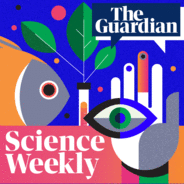Jon Watts, the Guardian’s global environment editor, goes in search of answers to the question the journalist Dom Phillips was investigating when he was murdered: how to save the Amazon? In episode two of this miniseries from June 2025, Jon meets the people trying to make sure the rainforest is worth more standing than cut down – from a government minister attempting to establish Brazil’s ‘bioeconomy’ to a startup founder creating superfood supplements and a scientist organising night-time tours hunting for bioluminescent fungi. Jon explores new ways of finding value in the forest and asks whether they will be enough to secure its survival. Help support our independent journalism at theguardian.com/sciencepod

Wissenschaft & Technik
Science Weekly Folgen
Twice a week, the Guardian brings you the latest science and environment news
Folgen von Science Weekly
299 Folgen
-
Folge vom 06.11.2025Revisited: How to save the Amazon episode two: the magic and mystery
-
Folge vom 05.11.2025Revisited: How to save the Amazon episode one: the stakesGlobal environment editor Jon Watts goes in search of answers to the question the journalist Dom Phillips was investigating when he was murdered: how to save the Amazon? In episode one of this miniseries from June 2025, Jon explores what’s at stake if we fail to act in time. He hears about the crucial role of the rainforest for South America and the global climate, and asks how cattle ranching came to dominate and destroy huge swathes of the rainforest – pushing it to a dangerous tipping point today. Help support our independent journalism at theguardian.com/sciencepod
-
Folge vom 04.11.2025‘We must change course’: a stark climate warning from the UN chiefAs global leaders and environmental activists descend on Brazil for next week’s Cop30 climate summit, Madeleine Finlay speaks to the Guardian’s global environment editor, Jon Watts, who recently sat down for an exclusive interview with the UN secretary general, António Guterres. As he approaches his penultimate summit as the UN chief, Guterres reflected on humanity’s progress in attempting to limit global warming to 1.5C above pre-industrial levels, why Indigenous voices must be listened to and how he remains positive in the face of the climate crisis. Help support our independent journalism at theguardian.com/sciencepod
-
Folge vom 30.10.2025A Scottish tea mystery: a bag for life – episode threeScience correspondent Nicola Davis investigates the strange story of Tam O’Braan and his attempts to grow tea in Scotland. In episode three, all of Tam’s lies come to a head and Stuart uncovers exactly where Tam was sourcing tea to supply to hotels and shops. At trial, Tam takes the stand and Richard and the Scottish growers finally get some answers. But what remains today of the nascent Scottish tea industry that Tam instigated?. Help support our independent journalism at theguardian.com/sciencepod
